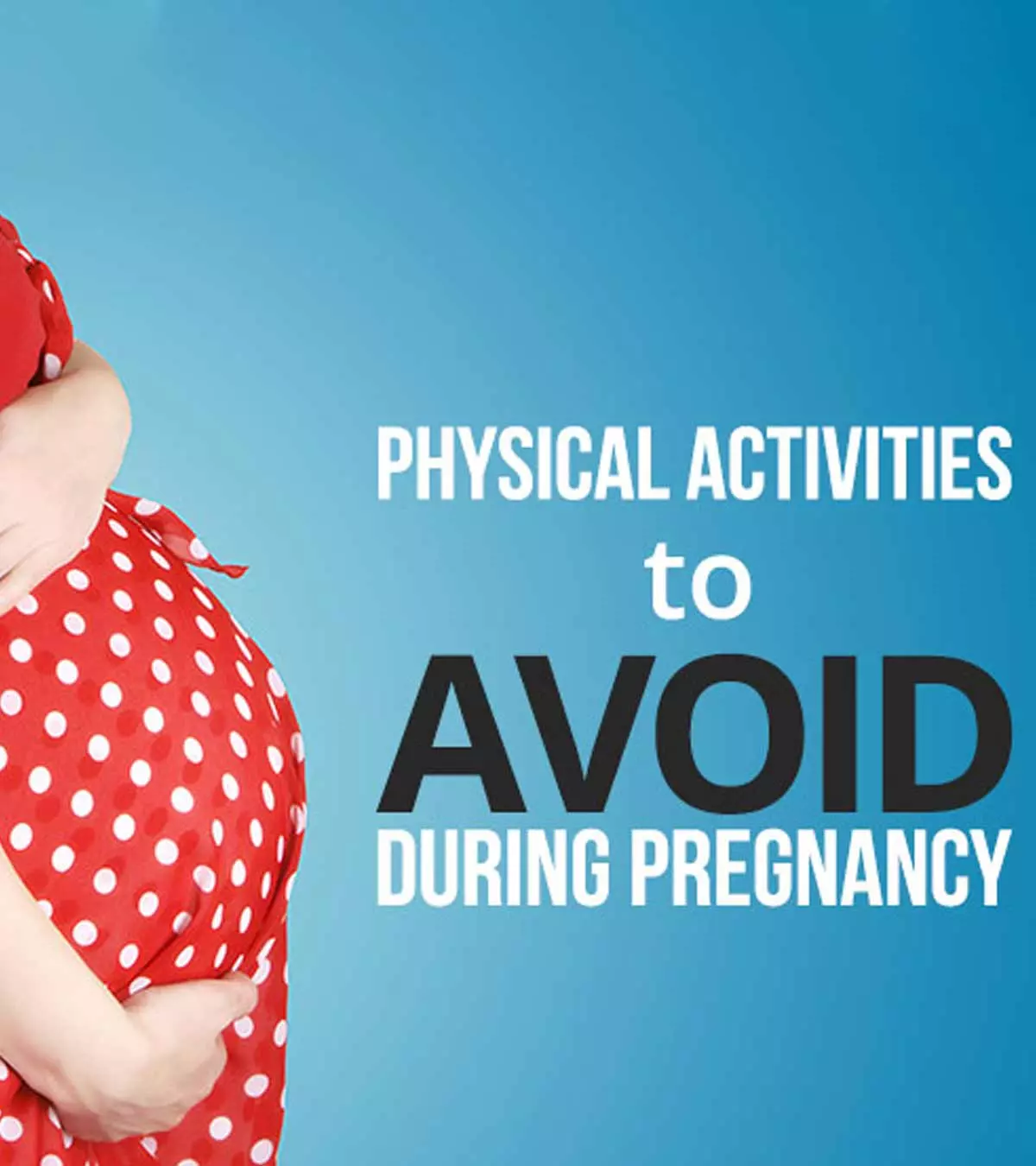

Image: Shutterstock
Pregnancy after 30 is a personal choice, and many women have healthy and successful pregnancies. Although there are some risks and complications that can arise in pregnancies in the late 30s, good prenatal care could help you overcome them. Most women delay pregnancy while focusing on a career or other personal reasons.
Fertility declines when age advances. However, there won’t be a dramatic decline in the early 30s, and you may become pregnant naturally. Nevertheless, fertility treatments and good prenatal care can help many women to have healthy babies in their 30s. Read on to know more about the benefits, risk factors, and chances of pregnancy after 30.
Is It Safe To Get Pregnant In Your 30s?
Yes, you can become pregnant even after 30 years. However, do keep in mind that the chance of getting pregnant naturally after 30 can be less when compared to a younger age since female fertility declines gradually over time.
Biologically, the best age to get pregnant is between the ages of 20 and 30 years (1) (2). Fertility issues can often arise at later ages due to the risk of endometriosis or fibroids. This may vary in each woman based on individual risk factors; that is, some can have a healthy pregnancy at age 30 or more, where a few may face complications.
Tips To Get Pregnant In The 30s?
The partners should be in good health. A healthy lifestyle may increase your chance of getting pregnant and having a healthy pregnancy in your 30s. Keep the following points in mind to enhance your fertility.
- Manage your weight: Chances of conceiving can often be affected by overweight or underweight. Women who have body mass index (BMI) below 19 and above 30 may face fertility issues due to irregular periods or amenorrhea (missing period for more than three months). Maintaining a healthy weight can boost your chance of getting conceived.
- Your partner’s health is important, too: Your partner also needs to be healthy to maintain his fertility. Men who have BMI above 30 may have a lower fertility rate than others (3). Therefore, a healthy weight is important for them as well.
- Say no to alcohol and smoking: Both partners should avoid smoking and drinking before conception to improve fertility. Maternal smoking and alcoholism can have an adverse impact on the baby. They may have a higher risk for developmental defects and other issues. If you have an addiction for cigarettes or alcohol, then consult your doctor for the cessation of these habits before planning a pregnancy (4) (5).
- Reduce stress: Increased levels of stress hormones may affect your physical and mental health. This may also interfere with your fertility.
- Check your regular medications: If you are already on a prescription for any medical conditions, then discuss with your doctor before planning to get pregnant. They may change the dosage or the medicines to prevent an effect on your pregnancy.
These tips can improve your chances of getting pregnant. However, if you are above 35 and fail to conceive after trying for six months, then consult your doctor.
How To Conceive Naturally After 30?
The best time for a woman to get pregnant is around ovulation days, that is, when the ovaries release eggs.
- In a regular menstruation cycle of 28 days, ovulation can usually happen on the 14th day of the cycle. Intercourse on the day of ovulation and four days before it increases your probability of natural conception. The following points may help you with it.
- Eggs are viable for 12 to 24 hours, while sperm can be viable for up to five days in a woman’s body. Pregnancy happens when a sperm fertilizes a viable egg (6).
- If you are unsure about ovulation or having irregular periods, try to have sex every 2 to 3 days to increase your chance of pregnancy. If your periods are irregular and you have not been able to conceive, then consult a qualified fertility specialist.
- According to RCOG, there is a 75% chance to conceive naturally within a year at 30, and it may decline to 66% by 35. This can be due to the limited number of the egg (ovum) in the ovary, and the quality and quantity of the eggs decline in the mid-30s or in the late 30s. Although men do have declining fertility over time, it may not be as drastic as that in women (7).
Experts advise couples above the age of 35 years to approach fertility specialists if they fail to conceive naturally for six months. Fertility assistance may be required for conception beyond this age.
Care To Take During Pregnancy After 30
Irrespective of their age, women have various physical changes during pregnancy. But it may require more effort to cope once you are older than 30. The following measures can help your body be better prepared for pregnancy.
- Healthy lifestyle: Following a healthy diet and fitness routine can help manage the physical changes of the pregnancy. An active lifestyle during pregnancy can help reduce the risk of many pregnancy-related diseases and symptoms. You may seek medical advice to modify your fitness practices for each trimester of pregnancy (4).
- Exercise: If you have been practicing some fitness activities before pregnancy, then you may continue it after seeking advice from an expert. If you are a beginner, do easy physical activities such as walking, swimming, or yoga, but only after talking to your ob/gyn.
- Regular checkups: Do not miss your appointments with the healthcare provider. Get the scans and other tests done on time and talk to your doctor about any health concerns or fears you might have about your pregnancy.
Risks And Complications Of Pregnancy After 30
Pregnancy complications can happen at any age. However, pregnancy after 30 might have an increased risk of the following (8) (9).
- Miscarriage or early pregnancy loss
- Birth defects
- Preterm birth or premature birth
- Low birth weight babies
- Gestational diabetes mellitus
- Preeclampsia (high blood pressure with signs of organ damage)
- Pregnancy-induced hypertension
- Labor difficulties or premature labor
- Higher chance of multiple pregnancies
- Increased chance for a C-section delivery
- High risk for ectopic pregnancy
Genetic Issues When Pregnant After 30
Advanced maternal age can increase the risk of chromosomal abnormalities. The following are some genetic issues that can occur in pregnancies after 30.
The risk of having a baby with Down syndrome can be 1 in 100 for mothers nearing 40, whereas this can be 1 in 1,250 for younger women. Statistics may show the birth of more Down syndrome babies to mothers under age 35 since there is more birth rate in this age group than others (8).
When To See A Doctor?
It is essential to seek medical advice if you are planning to become pregnant in the late 30s or beyond. This could help you to understand your health status and future risks of pregnancy.
- If you are older than 35 and fail to become pregnant after trying to conceive for six months, make an appointment with a fertility specialist. They can help you figure out what is delaying your pregnancy and may intervene with fertility assistance such as artificial insemination or in vitro fertilization.
- If you are already pregnant, then make a prenatal appointment to assess your health. Your doctor can prescribe you prenatal vitamins and supplements such as iron, folate, etc. They may also provide you a plan for prenatal care appointments for genetic testing and other prenatal testing such as ultrasound.
Pregnancy After 30: Are There Any Benefits?
Couples may want to postpone their pregnancy to the 30s and beyond due to various reasons. Some of them are (10):
- Financial stability: Most couples are settled in their careers in their 30s. The better financial status can help parents afford baby items, keeping a nanny for help, and also to access better prenatal and postnatal care. Bringing up a child and managing a home can be much easier for financially settled parents.
- Relationship stability: Your relationship with your partner usually stabilizes by now and helps you decide if you want to take the next step by having a baby together.
- Matured enough to be parents: Life experiences could help you to be a better parent. Older parents can be calmer and friendly towards children.
Pregnancy at 30 is becoming increasingly popular nowadays, and many women choose to become pregnant at 30 either due to their reasons or to focus on their careers. For many couples, the 30s have become the new 20s. Although there are certain dangers and difficulties associated with late-term pregnancies, effective prenatal care, maintaining an appropriate weight and good diet, etc., can help you have a successful pregnancy. Pregnancy beyond 35, on the other hand, may be more challenging; thus, visit a doctor before choosing to have a baby after 30.
Infographic: Tips For Women Planning To Get Pregnant After 30
It is possible to have a healthy pregnancy in your 30s, provided you follow some crucial steps to increase the chances of conception and prepare yourself for a safe pregnancy journey. This infographic outlines some key facts and beneficial tips to note while planning for pregnancy in your 30s. Illustration: Momjunction Design Team
References
1. Age and fertility; BetterHealth; Victoria State Government
2. Carlo Bellieni, The Best Age for Pregnancy and Undue Pressures; The United States National Library of Medicine (NLM)
3. Maximising Natural Fertility; Reproductive & sexual health; Family Planning New South Wales, Australia
4 Steps to take before you get pregnant; The United States National Library of Medicine (NLM)
5. Planning your pregnancy; The National Health Service
6. Trying to get pregnant; The National Health Service
7. Health matters: reproductive health and pregnancy planning; Public Health England
8. Risks of Pregnancy Over Age 30; The University of Rochester Medical Center
9. Reeta Lampinen, et al.; A Review of Pregnancy in Women Over 35 Years of Age; The United States National Library of Medicine (NLM)
10. M. Myrskyla et al.; Advantages of later motherhood; The United States National Library of Medicine (NLM)
Community Experiences
Join the conversation and become a part of our nurturing community! Share your stories, experiences, and insights to connect with fellow parents.
Read full bio of Dr. Deepti Gupta
Read full bio of Dr Bisny T. Joseph















